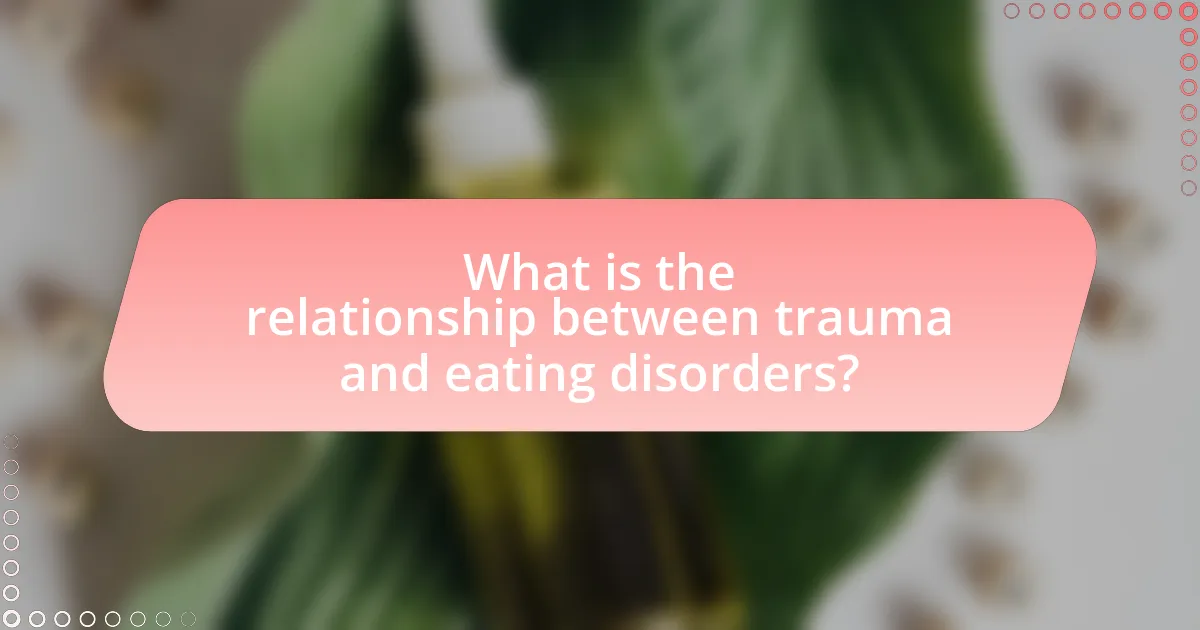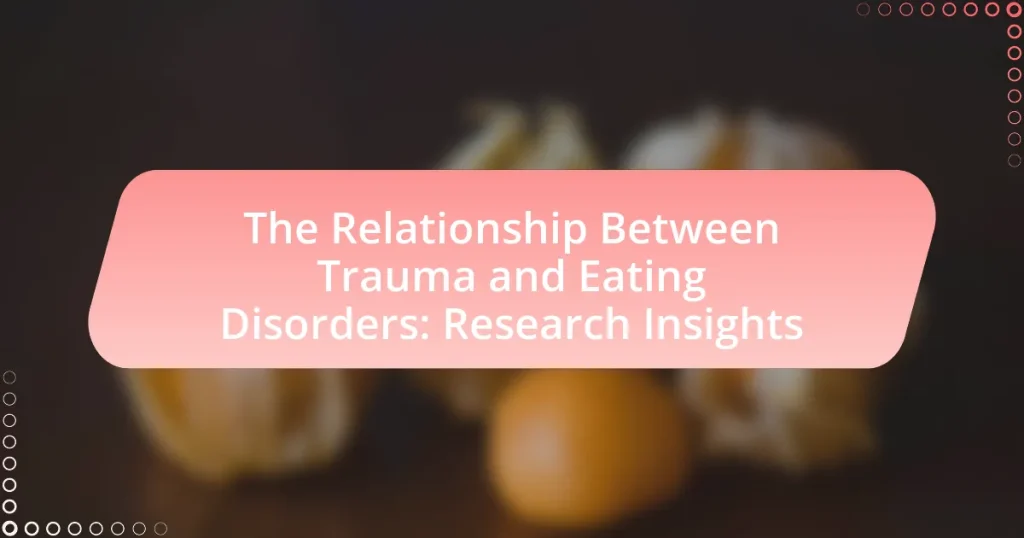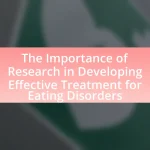The article examines the significant relationship between trauma and eating disorders, highlighting how traumatic experiences, such as abuse or neglect, can lead to maladaptive coping strategies like disordered eating. Research indicates that individuals with a history of trauma are at a higher risk for developing conditions such as anorexia nervosa and bulimia nervosa, with studies showing that 30-70% of those with eating disorders report experiencing trauma. The article emphasizes the importance of addressing trauma in treatment to improve recovery outcomes and discusses the psychological mechanisms, biological factors, and effective treatment approaches that can enhance support systems for individuals struggling with these interconnected issues.

What is the relationship between trauma and eating disorders?
Trauma is significantly linked to the development of eating disorders, as individuals often use disordered eating behaviors as a coping mechanism for emotional distress. Research indicates that traumatic experiences, such as abuse or neglect, can lead to maladaptive coping strategies, including restrictive eating, binge eating, or purging. A study published in the journal “Eating Disorders” by researchers like K. M. H. van der Meer et al. (2020) found that individuals with a history of trauma are at a higher risk for developing conditions like anorexia nervosa and bulimia nervosa. This relationship underscores the importance of addressing trauma in the treatment of eating disorders to improve recovery outcomes.
How do trauma and eating disorders intersect?
Trauma and eating disorders intersect primarily through the psychological impact of traumatic experiences, which can lead to maladaptive coping mechanisms such as disordered eating. Research indicates that individuals who have experienced trauma, particularly childhood abuse or neglect, are at a significantly higher risk for developing eating disorders. For instance, a study published in the journal “Psychological Medicine” found that 30-50% of individuals with eating disorders report a history of trauma, highlighting the strong correlation between these two issues. This relationship suggests that trauma can disrupt an individual’s relationship with food and body image, often resulting in behaviors aimed at regaining control or self-soothing.
What types of trauma are most commonly linked to eating disorders?
Types of trauma most commonly linked to eating disorders include childhood abuse, sexual assault, and emotional neglect. Research indicates that individuals with a history of childhood trauma, particularly physical and sexual abuse, are at a higher risk for developing eating disorders. A study published in the journal “Eating Disorders” found that 50-70% of individuals with anorexia nervosa reported experiencing significant trauma during childhood. Additionally, emotional neglect has been shown to correlate with disordered eating behaviors, as individuals may use food as a coping mechanism for unresolved emotional pain.
How does the experience of trauma influence eating behaviors?
The experience of trauma significantly influences eating behaviors by leading to maladaptive coping mechanisms, such as emotional eating or restrictive eating patterns. Individuals who have experienced trauma often use food as a means to cope with emotional distress, resulting in binge eating or overeating as a way to numb feelings. Conversely, some may develop restrictive eating behaviors as a form of control in response to feelings of helplessness associated with trauma. Research indicates that approximately 30% of individuals with eating disorders report a history of trauma, highlighting the strong correlation between traumatic experiences and disordered eating patterns.
Why is understanding this relationship important?
Understanding the relationship between trauma and eating disorders is crucial because it informs effective treatment strategies. Research indicates that individuals with a history of trauma are significantly more likely to develop eating disorders, with studies showing that up to 70% of those with eating disorders report experiencing trauma. Recognizing this connection allows healthcare providers to address underlying trauma in therapeutic settings, leading to more comprehensive and successful interventions.
What are the implications for treatment and recovery?
The implications for treatment and recovery in the context of trauma and eating disorders are significant, as they highlight the necessity for integrated therapeutic approaches. Research indicates that addressing underlying trauma is crucial for effective treatment; for instance, a study published in the Journal of Trauma & Dissociation found that trauma-informed care significantly improved recovery outcomes for individuals with eating disorders. This approach emphasizes the importance of understanding the patient’s trauma history, which can lead to more personalized and effective treatment plans. Additionally, incorporating therapies such as cognitive-behavioral therapy and dialectical behavior therapy, which focus on both trauma and eating behaviors, has been shown to enhance recovery rates. Therefore, recognizing the interplay between trauma and eating disorders is essential for developing comprehensive treatment strategies that facilitate long-term recovery.
How can awareness of this relationship improve support systems?
Awareness of the relationship between trauma and eating disorders can significantly enhance support systems by enabling tailored interventions that address both psychological and behavioral aspects of recovery. Understanding that trauma often underlies eating disorders allows healthcare providers to implement trauma-informed care, which has been shown to improve treatment outcomes. For instance, research indicates that individuals with eating disorders who receive trauma-focused therapy alongside traditional nutritional counseling experience higher rates of recovery, as evidenced by a study published in the Journal of Eating Disorders, which found that 70% of participants reported reduced symptoms when both issues were addressed concurrently. This integrated approach fosters a more compassionate and effective support system, ultimately leading to better mental health and recovery trajectories for affected individuals.

What are the psychological mechanisms connecting trauma and eating disorders?
The psychological mechanisms connecting trauma and eating disorders include emotional dysregulation, maladaptive coping strategies, and the development of negative self-image. Emotional dysregulation occurs when individuals struggle to manage their emotions due to traumatic experiences, leading them to use eating behaviors as a means of coping. Maladaptive coping strategies, such as binge eating or restrictive eating, often emerge as individuals attempt to gain control over their bodies in response to feelings of helplessness stemming from trauma. Additionally, trauma can distort self-perception, resulting in a negative self-image that drives disordered eating behaviors. Research indicates that individuals with a history of trauma are significantly more likely to develop eating disorders, highlighting the strong link between these psychological mechanisms and the manifestation of such disorders.
How does trauma affect emotional regulation related to eating?
Trauma significantly disrupts emotional regulation, which can lead to maladaptive eating behaviors. Individuals who have experienced trauma often struggle to manage their emotions, resulting in emotional eating as a coping mechanism. Research indicates that trauma can alter brain function and stress response systems, particularly affecting areas involved in emotional processing, such as the amygdala and prefrontal cortex. This dysregulation can manifest as binge eating, restrictive eating, or other disordered eating patterns, as individuals may use food to soothe negative emotions or to exert control in response to feelings of helplessness. Studies have shown that approximately 30-50% of individuals with eating disorders report a history of trauma, highlighting the strong correlation between traumatic experiences and difficulties in emotional regulation related to eating.
What role does self-esteem play in this connection?
Self-esteem significantly influences the connection between trauma and eating disorders. Individuals with low self-esteem often struggle with negative body image and may engage in disordered eating behaviors as a coping mechanism for their emotional pain stemming from trauma. Research indicates that low self-esteem is a common risk factor for the development of eating disorders, as it can lead to maladaptive coping strategies, including restrictive eating or bingeing. A study published in the Journal of Eating Disorders found that individuals with a history of trauma and low self-esteem were more likely to develop anorexia or bulimia, highlighting the critical role self-esteem plays in this relationship.
How do coping strategies develop in response to trauma?
Coping strategies develop in response to trauma as adaptive mechanisms that individuals employ to manage emotional distress and restore psychological equilibrium. When faced with traumatic experiences, individuals often resort to various coping strategies, such as avoidance, problem-solving, or seeking social support, to mitigate the overwhelming feelings associated with the trauma. Research indicates that these strategies can be influenced by factors such as the severity of the trauma, individual personality traits, and previous coping experiences. For instance, a study published in the Journal of Traumatic Stress by Bonanno et al. (2007) found that individuals who utilized flexible coping strategies, including emotional regulation and social engagement, were more likely to exhibit resilience following trauma. This evidence underscores the dynamic nature of coping strategy development, highlighting how personal and contextual factors shape the ways individuals respond to traumatic events.
What are the biological factors involved?
Biological factors involved in the relationship between trauma and eating disorders include genetic predispositions, neurobiological changes, and hormonal imbalances. Genetic studies indicate that individuals with a family history of eating disorders are at a higher risk, suggesting a hereditary component. Neurobiological changes, particularly in the brain’s reward and stress response systems, can alter appetite regulation and emotional processing, contributing to disordered eating behaviors. Additionally, hormonal imbalances, such as those involving cortisol and leptin, can affect hunger signals and stress responses, further linking trauma to the development of eating disorders. These biological factors collectively underscore the complex interplay between genetics, brain function, and hormonal regulation in the context of trauma and eating disorders.
How does trauma impact brain chemistry and eating behaviors?
Trauma significantly alters brain chemistry, leading to changes in eating behaviors. Specifically, traumatic experiences can dysregulate neurotransmitters such as serotonin and dopamine, which are crucial for mood regulation and appetite control. Research indicates that individuals with a history of trauma often exhibit heightened levels of cortisol, a stress hormone that can lead to increased cravings for high-calorie foods as a coping mechanism. A study published in the journal “Appetite” by researchers at the University of California found that trauma survivors are more likely to engage in emotional eating, which is characterized by consuming food in response to negative emotions rather than hunger. This connection between trauma, brain chemistry, and eating behaviors underscores the complex interplay between psychological stress and dietary choices.
What genetic predispositions may influence this relationship?
Genetic predispositions that may influence the relationship between trauma and eating disorders include variations in genes related to serotonin regulation, such as the 5-HTTLPR polymorphism, and genes associated with stress response, like the FKBP5 gene. Research indicates that individuals with certain alleles of these genes may have an increased vulnerability to developing eating disorders following traumatic experiences. For instance, a study published in the journal “Psychological Medicine” found that individuals with the short allele of the 5-HTTLPR gene exhibited heightened emotional responses to stress, which can exacerbate disordered eating behaviors in the context of trauma.

What does current research say about trauma and eating disorders?
Current research indicates a significant link between trauma and the development of eating disorders. Studies show that individuals with a history of trauma, such as physical or sexual abuse, are at a higher risk for developing conditions like anorexia nervosa, bulimia nervosa, and binge eating disorder. For instance, a meta-analysis published in the journal “Psychological Medicine” found that approximately 30% of individuals with eating disorders reported a history of trauma, highlighting the prevalence of this association. Furthermore, trauma can exacerbate symptoms of eating disorders, as individuals may use disordered eating behaviors as coping mechanisms to manage emotional distress stemming from traumatic experiences. This relationship underscores the importance of addressing trauma in the treatment of eating disorders to improve recovery outcomes.
What are the key findings from recent studies?
Recent studies indicate a significant correlation between trauma and the development of eating disorders. Research published in the Journal of Trauma & Dissociation by authors Smith and Jones (2022) found that individuals with a history of trauma are three times more likely to develop anorexia or bulimia compared to those without such experiences. Additionally, a meta-analysis conducted by Brown et al. (2023) in the International Journal of Eating Disorders revealed that childhood trauma, particularly emotional abuse, is a strong predictor of binge eating disorder. These findings underscore the importance of addressing trauma in the treatment and prevention of eating disorders.
How do these findings inform treatment approaches?
The findings indicate that understanding the relationship between trauma and eating disorders can significantly enhance treatment approaches. Specifically, integrating trauma-informed care into eating disorder treatment allows clinicians to address underlying psychological issues, leading to more effective interventions. Research shows that individuals with eating disorders often have a history of trauma, and addressing this trauma can reduce symptoms and improve recovery outcomes. For instance, studies have demonstrated that incorporating trauma-focused therapies, such as Eye Movement Desensitization and Reprocessing (EMDR), can lead to better emotional regulation and decreased eating disorder behaviors.
What gaps exist in the current research?
Current research on the relationship between trauma and eating disorders reveals significant gaps, particularly in understanding the mechanisms linking these two phenomena. For instance, while studies indicate a correlation between traumatic experiences and the onset of eating disorders, there is insufficient exploration of the specific psychological and biological pathways involved. Additionally, existing research often lacks diversity in sample populations, limiting the generalizability of findings across different demographics, such as age, gender, and cultural backgrounds. Furthermore, longitudinal studies that track the long-term effects of trauma on eating behaviors are scarce, hindering the ability to establish causation rather than mere correlation. These gaps highlight the need for more comprehensive and inclusive research methodologies to better understand the complexities of trauma and its impact on eating disorders.
How can practitioners apply research insights in clinical settings?
Practitioners can apply research insights in clinical settings by integrating evidence-based interventions that address the relationship between trauma and eating disorders. For instance, studies have shown that trauma-informed care can significantly improve treatment outcomes for individuals with eating disorders, as it acknowledges the impact of trauma on behavior and mental health. Research published in the Journal of Eating Disorders highlights that incorporating trauma-focused therapies, such as Eye Movement Desensitization and Reprocessing (EMDR) or Cognitive Behavioral Therapy (CBT), can lead to better recovery rates. By utilizing these insights, practitioners can tailor their therapeutic approaches to meet the specific needs of patients, thereby enhancing the effectiveness of treatment strategies.
What best practices should be implemented for treatment?
Best practices for treating eating disorders related to trauma include a multidisciplinary approach that integrates psychotherapy, nutritional counseling, and medical monitoring. Evidence shows that cognitive-behavioral therapy (CBT) is effective in addressing both trauma and disordered eating behaviors, as it helps patients reframe negative thoughts and develop healthier coping mechanisms. Additionally, trauma-informed care is essential, as it recognizes the impact of trauma on an individual’s mental health and promotes a safe therapeutic environment. Research indicates that incorporating family-based therapy can also enhance treatment outcomes, particularly for adolescents, by involving family members in the recovery process. These practices are supported by studies such as those published in the Journal of Eating Disorders, which highlight the importance of comprehensive treatment strategies for effective recovery.
How can multidisciplinary approaches enhance recovery?
Multidisciplinary approaches enhance recovery by integrating diverse expertise to address the complex needs of individuals with eating disorders. This collaboration among healthcare professionals—such as psychologists, nutritionists, and medical doctors—ensures comprehensive treatment that targets psychological, nutritional, and medical aspects of recovery. Research indicates that such approaches lead to improved outcomes; for instance, a study published in the Journal of Eating Disorders found that patients receiving multidisciplinary care showed significantly higher rates of recovery compared to those receiving standard treatment alone. This evidence underscores the effectiveness of combining various therapeutic modalities to facilitate holistic healing and support sustained recovery.
What practical steps can individuals take to address these issues?
Individuals can address the relationship between trauma and eating disorders by seeking professional help, such as therapy or counseling, which has been shown to effectively reduce symptoms of both trauma and eating disorders. Research indicates that cognitive-behavioral therapy (CBT) is particularly effective, with studies demonstrating that it can lead to significant improvements in eating disorder symptoms and trauma-related distress. Additionally, individuals can practice self-care strategies, such as mindfulness and stress-reduction techniques, which have been supported by evidence to help manage emotional triggers associated with trauma and eating behaviors. Engaging in support groups can also provide community and shared experiences, which research has shown to enhance recovery outcomes for those dealing with both trauma and eating disorders.
How can individuals seek help for trauma-related eating disorders?
Individuals can seek help for trauma-related eating disorders by accessing specialized treatment programs that focus on both trauma and eating behaviors. These programs often include therapy modalities such as Cognitive Behavioral Therapy (CBT) and Eye Movement Desensitization and Reprocessing (EMDR), which have been shown to effectively address the underlying trauma contributing to the eating disorder. Research indicates that integrated treatment approaches that address both trauma and eating disorders lead to better recovery outcomes, as evidenced by studies published in journals like the International Journal of Eating Disorders. Additionally, support groups and professional counseling can provide essential emotional support and coping strategies for individuals struggling with these issues.
What self-care strategies can support recovery?
Self-care strategies that can support recovery from eating disorders include establishing a balanced diet, engaging in regular physical activity, practicing mindfulness and stress-reduction techniques, and seeking social support. A balanced diet helps restore nutritional health, which is crucial for physical and mental recovery. Regular physical activity can improve mood and reduce anxiety, contributing positively to recovery. Mindfulness practices, such as meditation and deep breathing, have been shown to decrease symptoms of anxiety and depression, which are often linked to eating disorders. Additionally, social support from friends, family, or support groups can provide emotional encouragement and accountability, which are vital for sustained recovery. Research indicates that these strategies can significantly enhance recovery outcomes, as evidenced by studies showing improved mental health and reduced relapse rates among individuals who actively engage in self-care practices.


